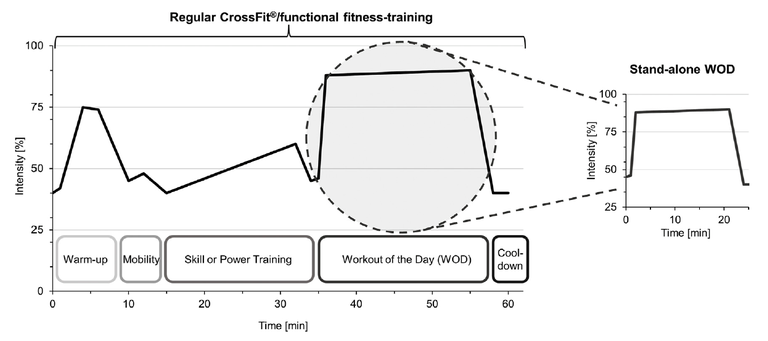
Physiological effects of regular CrossFit® training and the impact of the COVID-19 pandemic—A systematic review
24 April 2023
Abstract:
CrossFit® is a functional fitness training program known for its day-to-day varying “Workouts of the Day” (WOD). In accordance with the ‘CrossFit® Level 1 Training Guide’, regular CrossFit® training sessions consist of Warm-up, Mobility, Skill/ Power training, WOD, and Cool-down. Despite the fast-growing and widespread popularity, data on the practical implementation of the training program based on scientific evidence are rare. Therefore, the purpose of this study is to systematically review the existing literature on the physiological effects of regular CrossFit® training in full extent instead of stand-alone WODs and to examine the impact of the COVID-19 pandemic on the training behavior of CrossFit® athletes. A systematic search was conducted following the PRISMA guidelines in April 2022 and updated in July 2022 using the following databases: PubMed, SPORTDiscus, Scopus, and Web of Science. Using the keyword “CrossFit”, 1,264 records were found. Based on the eligibility criteria, 12 studies are included and separated by topics: acute-short term physiological response (n = 8), and impact of the COVID-19 pandemic (n = 4). The results show that studies of regular training sessions were rarely conducted and contradicted the existing knowledge of the physiological demands [e.g., heart rate (HR)] of CrossFit®. In detail, included studies demonstrate that training sessions last 30–60 min and provide a progressive increase in cardiovascular load up to maximal effort activity (>90% HRmax), differing from stand-alone WODs exclusively at high-intensity. Also, scarce research exists on COVID-19- pandemic-induced effects on training behavior, and studies are of moderate to low quality. There is still a lack of comprehensive analyses on the acute physiological effects of regular training sessions and the consequences of the COVID-19 pandemic in the scientific literature. Moreover, the inconsistent terminology used in CrossFit® research complicates generalized conclusions. Therefore, future research on the training methodology of CrossFit® needs to overcome terminological inequalities and examine scientifically the implementation of the concept by considering regular training sessions under practical settings.
https://www.frontiersin.org/articles/10.3389/fphys.2023.1146718/full





